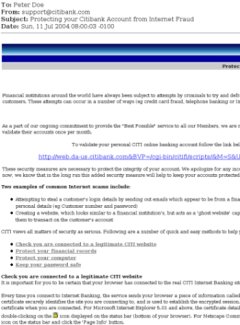 Chances are that when you open your inbox today you’ll find an e-mail claiming to be from your bank, an e-commerce site, or another online site you’ve visited. They might offer you an upgrade to your account, inform you that there’s been changes to their, and asks you to verify your account information. This could be a phishing attempt to get sensitive information like your personal information or passwords. Fortunately, you can avoid getting scammed by taking these precautions:
Chances are that when you open your inbox today you’ll find an e-mail claiming to be from your bank, an e-commerce site, or another online site you’ve visited. They might offer you an upgrade to your account, inform you that there’s been changes to their, and asks you to verify your account information. This could be a phishing attempt to get sensitive information like your personal information or passwords. Fortunately, you can avoid getting scammed by taking these precautions:
- Be suspicious of any email with urgent requests for personal financial information. Phishers are getting more sophisticated in their attempts, so even if an e-mail appears to be legitimate, look for proof that it came from your e-commerce company. They should be personalized and carry information that only you and your company would know. They might show partial account numbers or other verification tools.
- Use anti-virus software and a firewall, and keep them up to date. Phishers sometimes include script that can track your activities on the internet without your knowledge.
- Never use the links in an e-mail to go to any webpage. Phishers will redirect you to a bogus site to trick you into logging in your account number and password. Log onto the website by typing in the web address to your browser. At the same time, never call any numbers in the e-mail. It could lead you to a VoIP provider that isn’t connected to your company at all.
- Never fill out forms in e-mail messages asking for your personal financial information. Your e-commerce company would never ask you to send sensitive information in that manner.
- Check your bank, credit, and debit card statements regularly to see if all your transactions are legitimate. Report any suspicious withdrawals immediately.
- Finally, report the phishing attempt you received to your company and other anti-phishing groups.
[tags]phishing,spam,spoof emails,indentity theft,pharming,spam filtering[/tags]




